This post may contain affiliate links. Please read our disclosure policy.
This Kimchi Chicken Stir Fry is a culinary delight, combining juicy, tender velveted chicken and zesty fried kimchi in a noodle bowl that’s as easy as it is delicious. It’s a quick, 30-minute wonder that packs big flavors with less than 5 grams of net carbs.
And for those who adore beef, don’t miss out on our sister dish, the equally delectable Kimchi Beef Stir Fry. It’s another fantastic way to savor the rich, spicy flavors of kimchi, perfectly paired with succulent beef. Your taste buds will thank you!
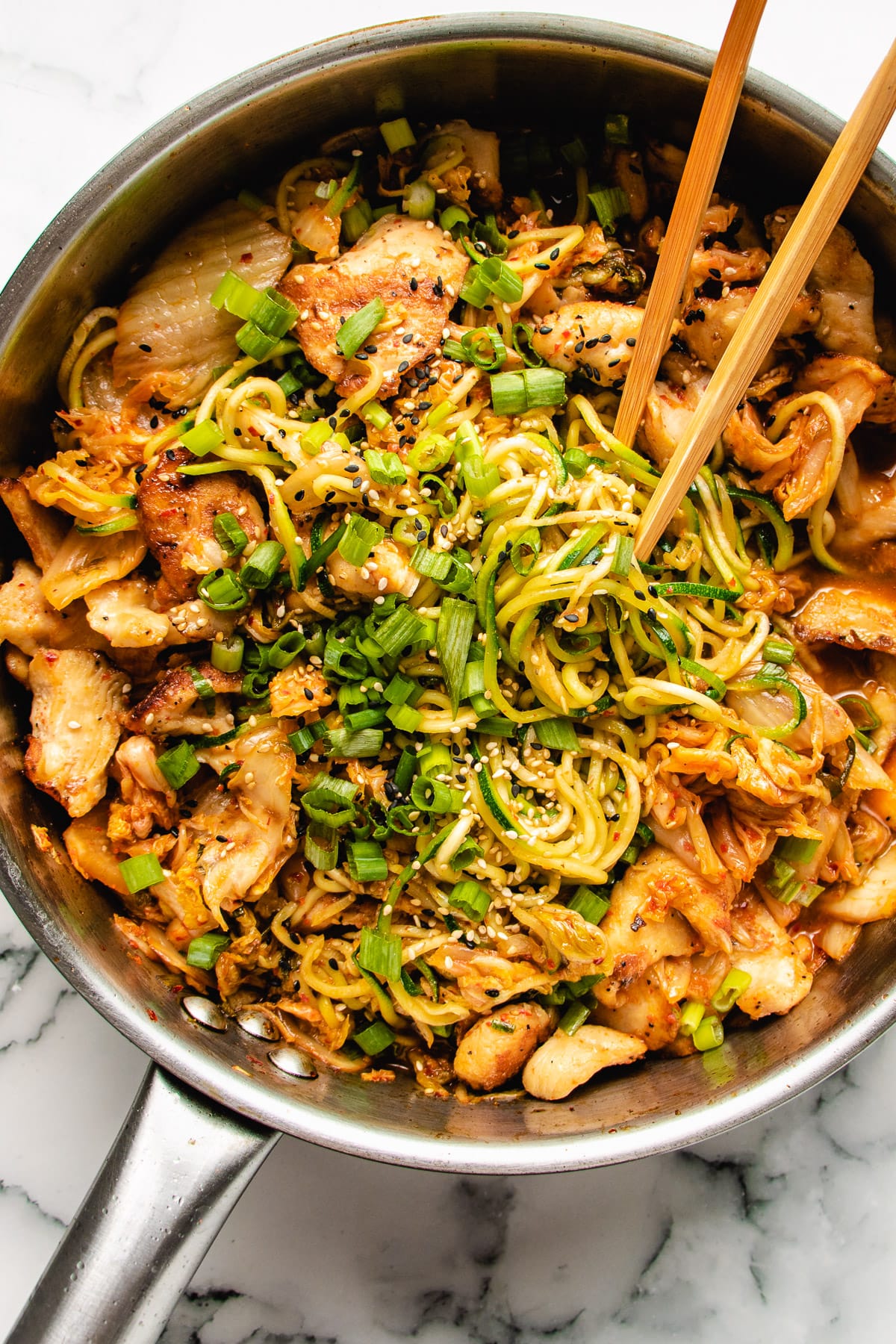
Table of Contents
Ingredients for kimchi chicken recipe
Every great dish starts with the right ingredients, and our chicken kimchi recipe is no exception! Let’s dive into the fresh and flavorful components that make this dish delicious.
- Chicken Breasts: The protein base of the dish, providing a lean and tender bite.
- Coconut Aminos: Adds a salty and slightly sweet flavor; use half the amount if substituting with soy sauce for a similar umami taste.
- Tapioca Starch: Used for velveting the chicken, giving it a tender texture. Cornstarch, arrowroot, or potato starch can also be used as alternatives.
- Baking Soda: Used in velveting, it tenderizes the chicken, making it soft and bouncy.
- Coarse Sea Salt: Enhances the natural flavors of the ingredients.
- Olive Oil: Used to help seal in the moisture of the chicken breasts, contributing to a juicy and tender result in the stir fry.
- White or Black Pepper: Adds a mild heat and aromatic depth to the chicken.
- Napa Cabbage Kimchi: Brings a tangy, spicy, and umami-rich flavor that’s central to the dish.
- Zucchini: Spiralized into noodles, it adds freshness and a light, healthy component. An optional ingredient.
- Garlic: Offers a pungent, earthy flavor that’s fundamental to stir-fry aromatics.
- Scallions: The white parts add a sharp bite while the green parts add color and a milder taste.
- Avocado Oil: Provides a high smoke point perfect for stir-frying and a neutral taste.
- Toasted Sesame Oil: A finishing oil that adds a nutty flavor and aroma.
- Toasted Sesame Seeds: Adds a crunch and nutty taste, enhancing the dish’s texture and presentation.
Tip for tender chicken breasts: Chinese stir-fried chicken is extra tender due to the velveting technique. Skinless chicken breast is sliced into thin, even-sized flat pieces (not strips) and then marinated briefly in a mix of baking soda, starch, cooking wine, and seasoning.
The quick cooking of stir-frying doesn’t allow time for seasonings to penetrate, so marinating or “velveting” beforehand is key. The marinade should contain an alkaline ingredient like baking soda to tenderize the meat. It only takes 10-15 minutes to tenderize the meat. See our article on velvet chicken for more info.
Substitutions and variations
- Different Proteins: Opt for chicken thighs or pork tenderloin for a different taste and texture. Check out our “how to velvet pork” article for tips on preparing pork.
- Alternative Seasonings: Try soy sauce for a deeper umami flavour, or stir in a tablespoon of gluten-free gochujang paste to spice things up.
- Vegetables: Short on kimchi? Use sauerkraut for a similar tangy flavor or explore my gluten free kimchi recipe for a homemade touch.
- Vegetarian: Swap the chicken for a firm or extra-firm tofu or egg tofu to make this dish vegetarian-friendly.
- Noodles: Not a fan of zucchini noodles? Feel free to use any noodles you prefer. Dive into our guide on “Type of Chinese noodles” to find your perfect match.
Choosing store-bought kimchi: A good kimchi should taste balanced. Not too sour, too spicy, or salty. It should taste zesty, fresh, slightly sweet, spicy, and not overly sour or salty. Many Western-made varieties tend to be too sour and lack the nuanced flavors of traditional Korean kimchi.
Look for brands like Tobagi mat kimchi (with gluten-free options), Bibigo, or Jongga at H-Mart for an authentic taste.
When buying kimchi for stir-frying, choose napa cabbage kimchi without oysters. ‘Mat kimchi’ indicates the cabbage is pre-sliced, making it convenient for cooking.
How to make chicken kimchi
Ready to cook? Here’s how to transform your ingredients into a mouthwatering kimchi and chicken. Whether you’re a seasoned cook or just starting, these instructions will guide you through the process for a perfect stir-fry every time.
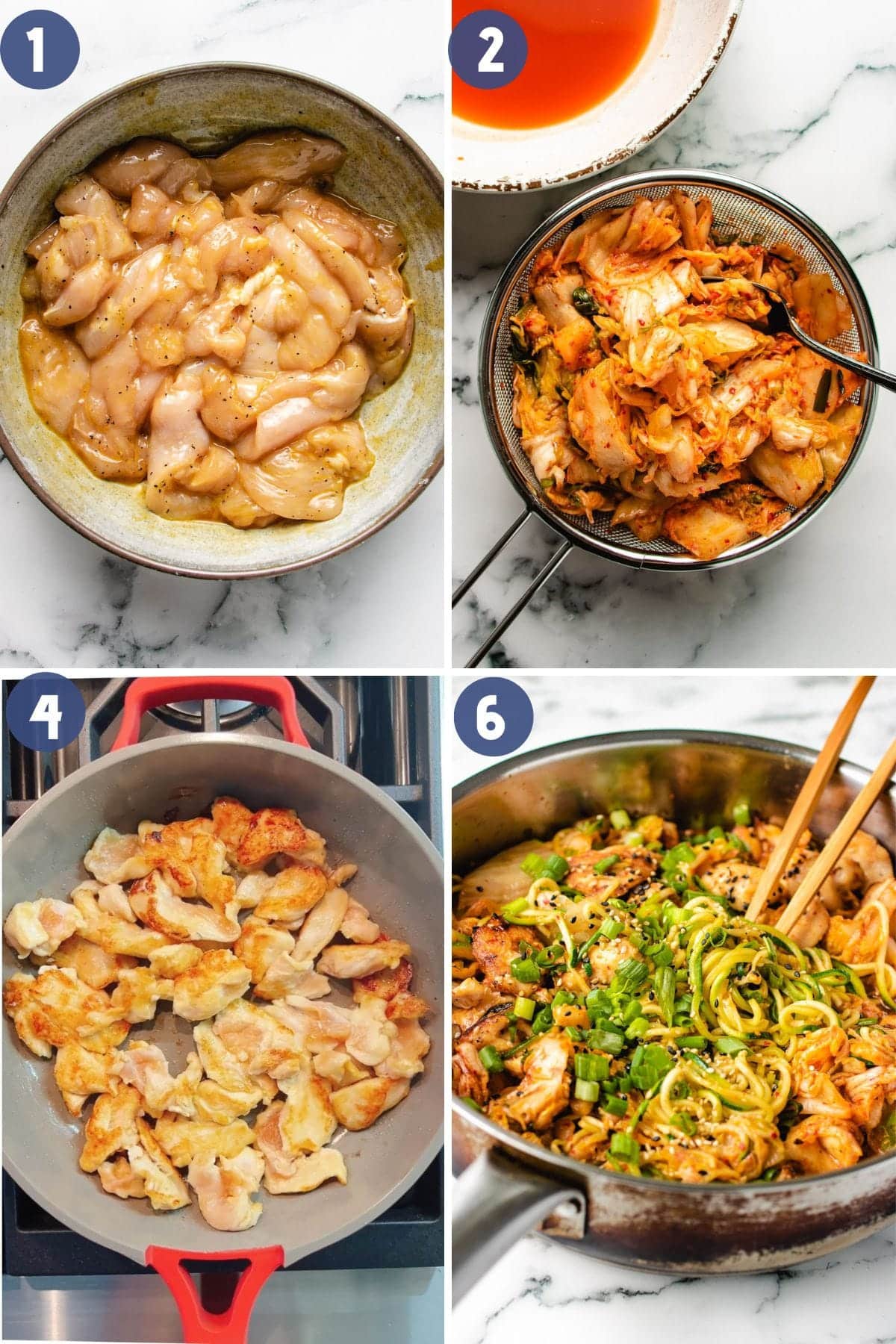
- Prepare the Chicken (Velveting Technique): Thinly slice the chicken breasts into 1/8-inch thin pieces against the grain. Velvet the chicken by marinating it with a mixture of coconut aminos, starch, baking soda, salt, and pepper. Allow it to rest in the fridge for 15 minutes to tenderize and imbue with flavors.
- Kimchi Prep: Drain the kimchi using a sieve and bowl, pressing gently to remove excess juice. Reserve the juice for later.
- Zucchini & Aromatics: If using zucchini noodles, prepare them and set aside. Finely chop garlic and scallions, keeping the white and green parts separate.
- Sear the Chicken: Heat a large skillet or wok over medium heat. Once hot, add oil and chicken in a single layer. Cook until golden brown on both sides and set aside.
- Saute Aromatics and Kimchi: In the same pan, add more oil, garlic, and white parts of the scallions. Stir-fry until fragrant. Increase heat, add kimchi, and stir fry kimchi for a minute before tossing in zucchini noodles.
- Combine and Finish: Return chicken to the pan, add kimchi juice, and toss everything together for half a minute. Adjust seasoning as needed.
- Garnish and Serve: Turn off the heat, transfer to a plate, garnish with green onions, and sprinkle with sesame seeds. Drizzle with sesame oil before serving.
How to use kimchi in cooking
Kimchi is full of flavor – it’s tangy, zesty, and slightly salty, perfect for adding a tasty punch to your dishes. You can enjoy kimchi cold or cooked. Just remember, when stir-frying with kimchi, keep an eye on the moisture to make sure everything stays crisp and flavorful, not too wet or dry. Here’s how to achieve that:
- Drain the Kimchi: Set the kimchi in a sieve and gently press out the juice with a spoon, separating the solids from the liquid.
- Reserve the Juice: Don’t discard the flavorful kimchi juice; instead, set it aside to use as a dynamic seasoning sauce during cooking.
- Add Back the Juice: Before you finish cooking, gradually add the kimchi juice back into the pan, tablespoon by tablespoon. This acts similar to deglazing, introducing a burst of flavor while keeping the kimchi stir-fry lively and crisp.
Keep your pan hot (but not too hot) throughout the entire stir-fry. Listen for a steady sizzle as you cook. For tips on getting the perfect pan temperature, check out my how to make beef stir fry article.
How to make-ahead, store, and reheat
Kimchi and chicken stir fry is not only easy and simple to make but also perfect for preparing ahead! Here’s how to effortlessly plan, store, and reheat your meal, ensuring delicious results every time.
- Make-ahead: Velvet the chicken. Prepare and season the chicken up to a day in advance and keep it in the fridge. For longer storage, freeze the velveted chicken in a flat layer inside a freezer-friendly bag for up to 2 months. Thaw it overnight in the fridge before cooking.
- Storage: After cooking, store your dish in an airtight container in the refrigerator. It’s best enjoyed within 3 days for optimal taste.
- Reheat: To reheat, warm it on the stove until it’s heated throughout. Or, microwave on medium for 1 minute, stir and continue heating until it’s just right.
What to serve with kimchi chicken
Deciding what to serve with your chicken and kimchi? We’ve got you covered! Here are some perfect pairing suggestions to complete your meal, whether you’re looking for something light or hearty.
- Pair with Refreshing Side Dishes: Complement the rich flavors with something light and refreshing. Try it alongside a crisp bok choy kimchi, Korean zucchini side dish, or Korean cucumber salad. For a tangy kick, add Cucumber kimchi or a refreshing Mung bean sprouts recipe.
- Make a Hearty Meal: Turn it into a substantial feast by pairing it with flavorful mains. Enjoy it with Ding tai fun fried rice with shrimp, or serve Kimchi cauliflower fried rice or Gochujang pasta on the side.
Expert tips
- Choosing the Right Kimchi: For the best results in this stir fry, use napa cabbage kimchi without oysters, often labeled as ‘mat kimchi’. This type is pre-sliced, making it easier to cook with and ensuring the flavors and textures are ideal for the dish
- Draining the Kimchi: Before stir-frying, drain your kimchi well to remove excess moisture. This allows the kimchi to char nicely and become crisp, enhancing the texture and flavor concentration in the dish. Plus, the reserved juice becomes a valuable, tangy seasoning to add back in as you cook.
- Velveting Chicken Technique: Remember to thinly slice the chicken to 1/8 inch thickness and use the velveting technique with baking soda and starch. This ensures tender, restaurant-style chicken every time.
- Reserve and Season with Kimchi Juice: Use the drained kimchi juice strategically for seasoning. Add it back tablespoon by tablespoon towards the end of cooking to adjust flavor and moisture without overpowering the dish.
- Heat Management: Keep your pan consistently hot (but not scorching) to maintain a sizzle throughout the cooking process. This ensures a perfect sear on the chicken and crispness in the veggies.
- Make-Ahead Strategy: Prepare and season the chicken ahead of time and store it properly. Utilize the freezer to extend its shelf life and ensure a quick meal prep.
FAQs
Kimchi is typically made of fermented napa cabbage or radishes, seasoned with chili pepper, garlic, ginger, scallions, fish sauce, fermented shrimp paste, and various other spices. It’s a staple in Korean cuisine.
You can enjoy kimchi cold as a side, or use it in cooking; add cooked kimchi to soups, and stews, grill it with meats like Korean short ribs, or mix it into pancakes or omelets like gluten-free kimchi pancake.
Kimchi is often served with meat dishes, either as a side or integrated into recipes like Kalbi, kimchi beef stir fry, or pork. It’s also common to wrap grilled meats and kimchi with perilla leaves for a flavorful bite.
You can eat kimchi either hot or cold. Enjoy it cold as a crisp, refreshing side, or heat it in dishes like kimchi stews, soups, and stir-fries for a heartwarming meal.
More Korean recipes you might like
If you love Korean food as much as I do, here are some great choices that are loved by our readers:
- Kalbi: Savor these Korean BBQ short ribs, marinated in a sweet and savory sauce, then grilled or air-fried to perfection.
- Air Fryer Short Ribs: Enjoy tender, flavorful ribs made easy and quick with an air fryer, perfect for a hassle-free meal.
- Vegetarian Bibimbap Recipe: Dive into this colorful, hearty Korean rice dish, topped with a variety of seasoned vegetables, and a spicy gochujang sauce.
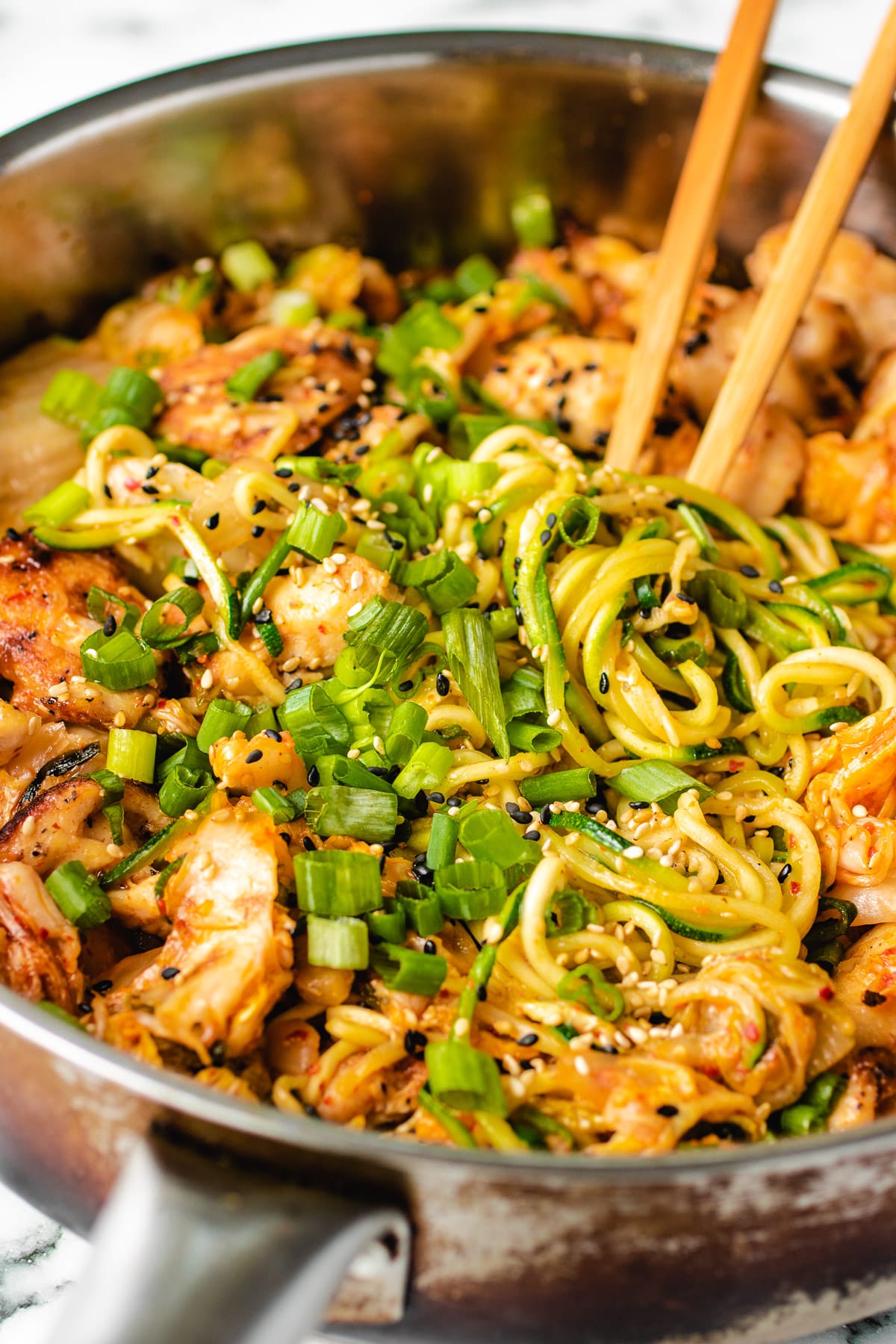
Kimchi chicken stir fry recipe

Ingredients
For the chicken
- 1 lb. chicken breasts thin sliced
- 1 tbsp coconut aminos or 0.5 tbsp soy sauce
- 1 tsp Tapioca starch or potato starch, or cornstarch
- ½ tsp baking soda
- ¼ tsp coarse salt
- ⅛ tsp black pepper or white pepper
- 0.5 tbsp olive oil divided
Others:
- 2.5 to 3 cup sliced napa cabbage kimchi
- 2 medium zucchini spiralized, optional
- 0.25 oz garlic finely chopped, 2 large cloves
- 2 bulbs scallions chopped and separate white and green parts
- 2.5 tbsp avocado oil divided
- 1 tbsp coconut aminos optional and to taste
- Drizzle Toasted sesame oil
- Sprinkle Toasted sesame seeds
Instructions
Slice and velvet the chicken:
- Hold your knife at a 45-degree angle to make the slice wider and flatter. Slice the chicken against the grain into thin pieces (about ⅛”).
- In a medium bowl, combine the chicken with ingredients from coconut aminos to olive oil. Mix well and set it aside in the fridge to marinate for 15 minutes.
Prepare the kimchi for stir frying:
- To press the kimchi before cooking, set aside a sieve, a spoon, and a medium size bowl. Add the kimchi to the sieve with a bowl under to catch the juice.. Use the back of a spoon to gently press and allow the kimchi juice to drain. By doing so, the kimchi will char nicely in stir frying and the kimchi juice becomes a seasoning sauce.
- Prepare the zucchini noodles, if using. Chop the garlic and scallions and separate the white and green pparts.
Pan sear the chicken:
- Preheat a large saute pan or wok over medium heat until it’s too hot to place your palm near the surface, about 2 to 3 inches away.
- Add 1 tbsp oil and swirl it around the skillet. Add the chicken, turn heat up to medium-high, and quickly spread out the chicken into a single layer. Pan fry them without disturbing until they are golden brown color, about 2-3 mins.
- Then use a spatula with a firm tip to flip and sear the flip side, about 1-2 mins. The chicken should be cooked through and golden brown on the outside.
Saute the vegetables:
- Use the same skillet and add 1.5 tbsp cooking fat, saute garlic and white scallion parts over medium heat until fragrant, 8-10 seconds.. Season with a pinch of salt and stir fry frequently to prevent them from burning.
- Turn the heat up to medium-high. Add the drained kimchi, saute for 1 minute to char the kimchi. Add the zucchini noodles, if using. Keep tossing for 30 seconds.
Combine with kimchi juice:
- Return the chicken to the pan and add add the 4-5 tablespoons of kimchi juice to season and deglaze the pan. Quickly toss for 30 seconds. Taste and adjust with more salt or a small dash of soy sauce.
- Turn off the heat. Transfer to a large serving plate and garnish with green scallion parts and sesame seeds. Drizzle with sesame oil. Serve warm.
- If desired, you can make the sauce thicker by scoping out the kimchi, chicken, and zucchini noodles. Reduce the liquid in the pan by turning up the heat for a few minute then pour it over the serving dish.
Notes
- Make-ahead: Velvet the chicken. Prepare and season the chicken up to a day in advance and keep it in the fridge. For longer storage, freeze the velveted chicken in a flat layer inside a freezer-friendly bag for up to 2 months. Thaw it overnight in the fridge before cooking. You can also learn more from my article on Chinese chicken stir fry marinade.
- Storage: After cooking, store your dish in an airtight container in the refrigerator. It’s best enjoyed within 3 days for optimal taste.
- Reheat: To reheat, warm it on the stove until it’s heated throughout. Or, microwave on medium for 1 minute, stir, and continue heating until it’s just right.
- Choosing store-bought kimchi: A good kimchi should taste balanced. Not too sour, too spicy, or salty. It should taste zesty, fresh, slightly sweet, spicy, and not overly sour or salty. Many Western-made varieties tend to be too sour and lack the nuanced flavors of traditional Korean kimchi. Look for brands at H-Mart like Tobagi mat kimchi (with gluten-free options), Bibigo, or Jongga for authentic taste. When buying kimchi for stir-frying, choose napa cabbage kimchi without oysters. ‘Mat kimchi’ indicates the cabbage is pre-sliced, making it convenient for cooking.
Nutrition
Nutrition information is automatically calculated, so should only be used as an approximation.
Made a dish and loved it? Please rate the recipe and leave a comment in the section below! It helps my blog grow organically, allowing me to continue sharing free and awesome content with you. Thank you!

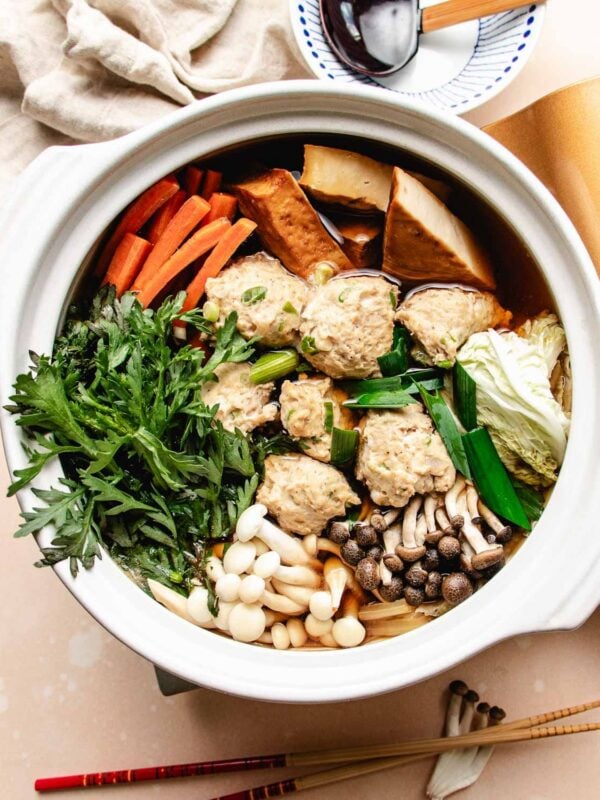

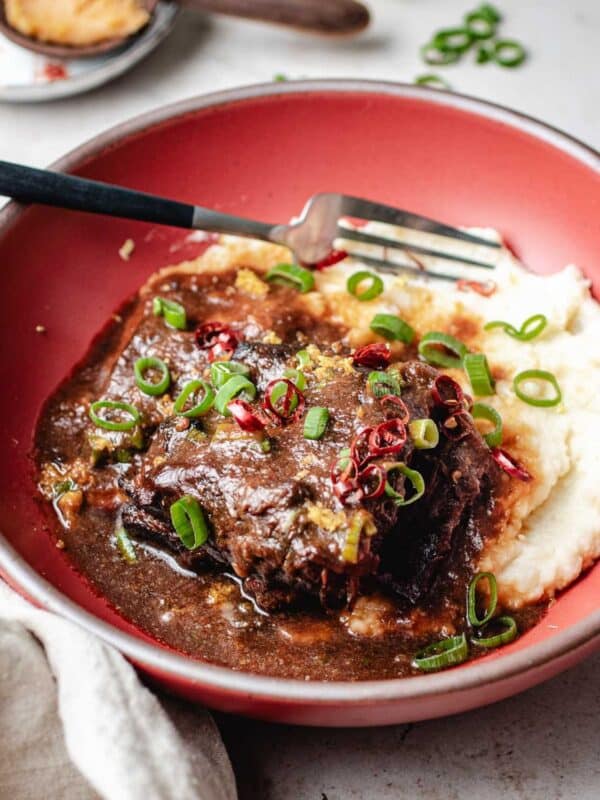
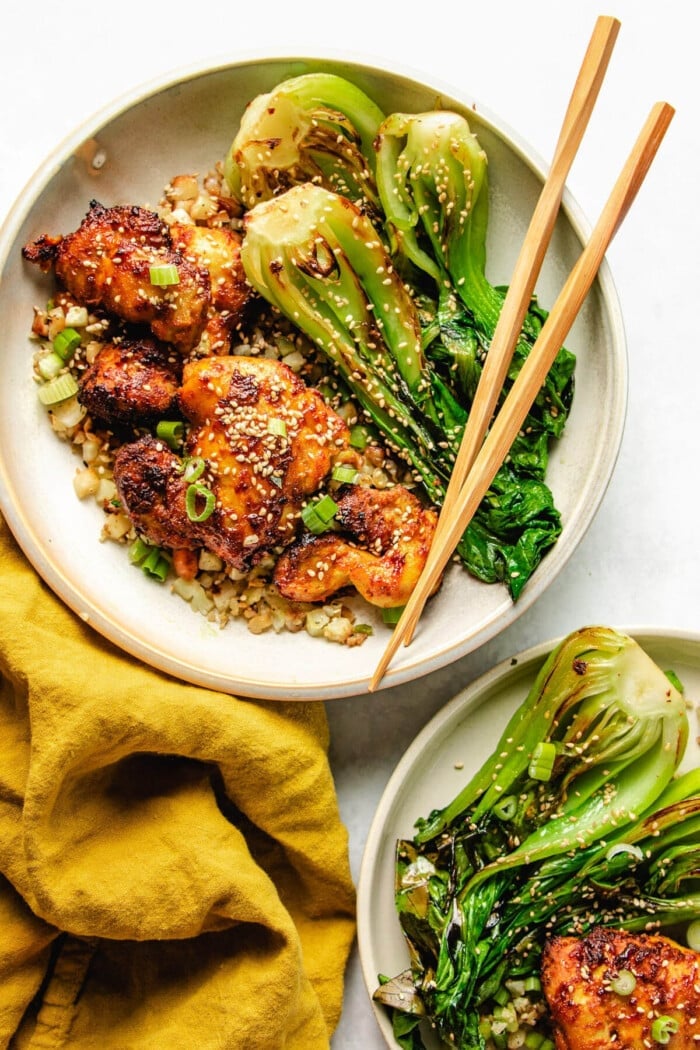








Another great recipe! I’m never disappointed when I try something new! This tastes like take out food without the guilt! This is definitely going on rotation!!
Thank you, Elena. So happy to hear!
Made this tonight (but with rice sticks – no zoodles). So good! I’m loving these ideas to cook with kimchi. Next goal – make my own!
YUM! Love rice sticks!
Yum! I’ve only eaten kimchi as a condiment so I’d love to try it cooked with chicken like this.
Thank you for your description of what kimchi tastes like . . . I have always been worried it would be too spicy! Will look for that brand you suggested — Can’t wait to make the recipe now!!!
Yes! I love kimchi and I’ve been looking for new ways to enjoy it! Can’t wait to make this for my family!
So delicious! Every bite is full of goodness – tender chicken, vegetables and that delicious kimchi!
Wow, this is really a tasty stir fry! So glad to found a different way to enjoy more kimchi!
Wow, I loved reading every word of this article, so informative and inspiring. Especially helpful to learn about Korean chili powder and its importance. Plus I’ve always wondered about the salted shrimp I see at our Asian market, and now I know. SUCH a delicious recipe.
Thanks, Megan!
You KNOW I love everything kimchi and this is fantastic! I’ll be making it again and again
Haha, Yes I do!